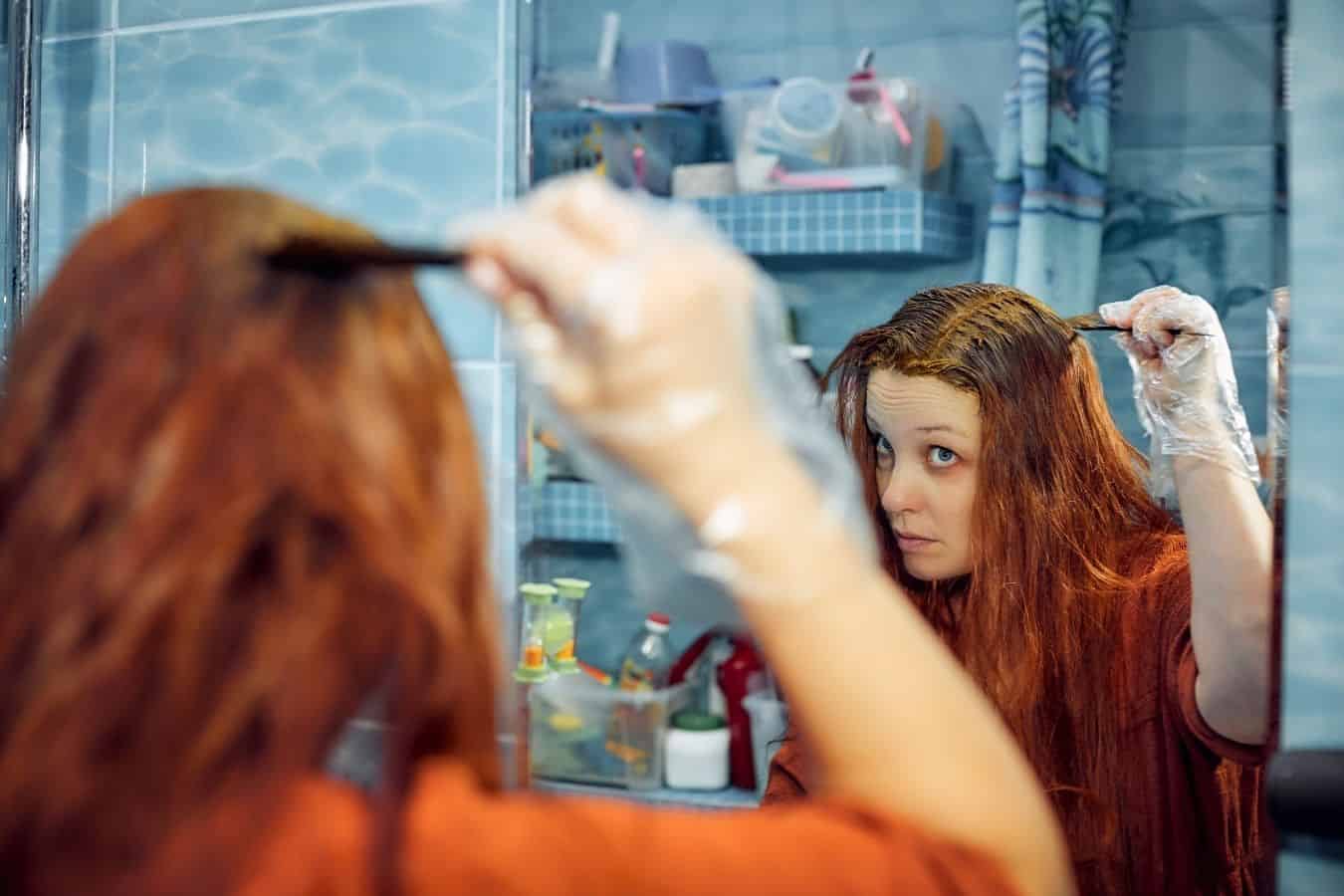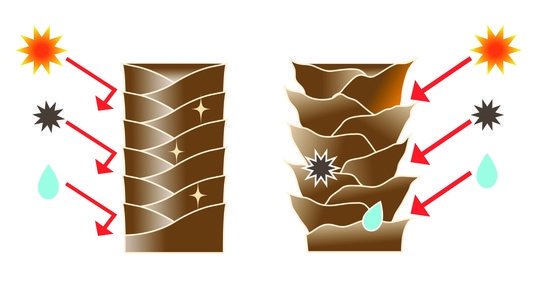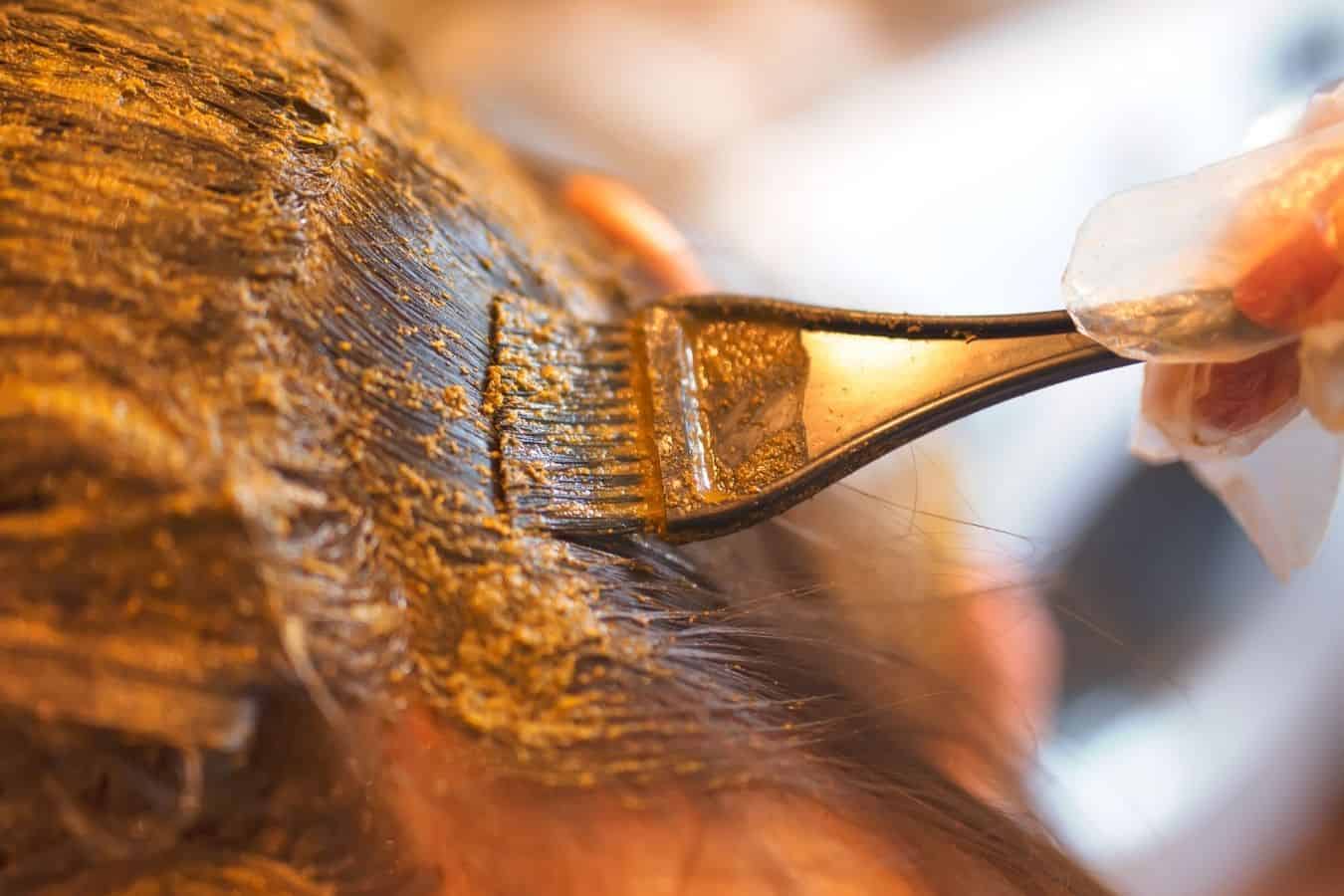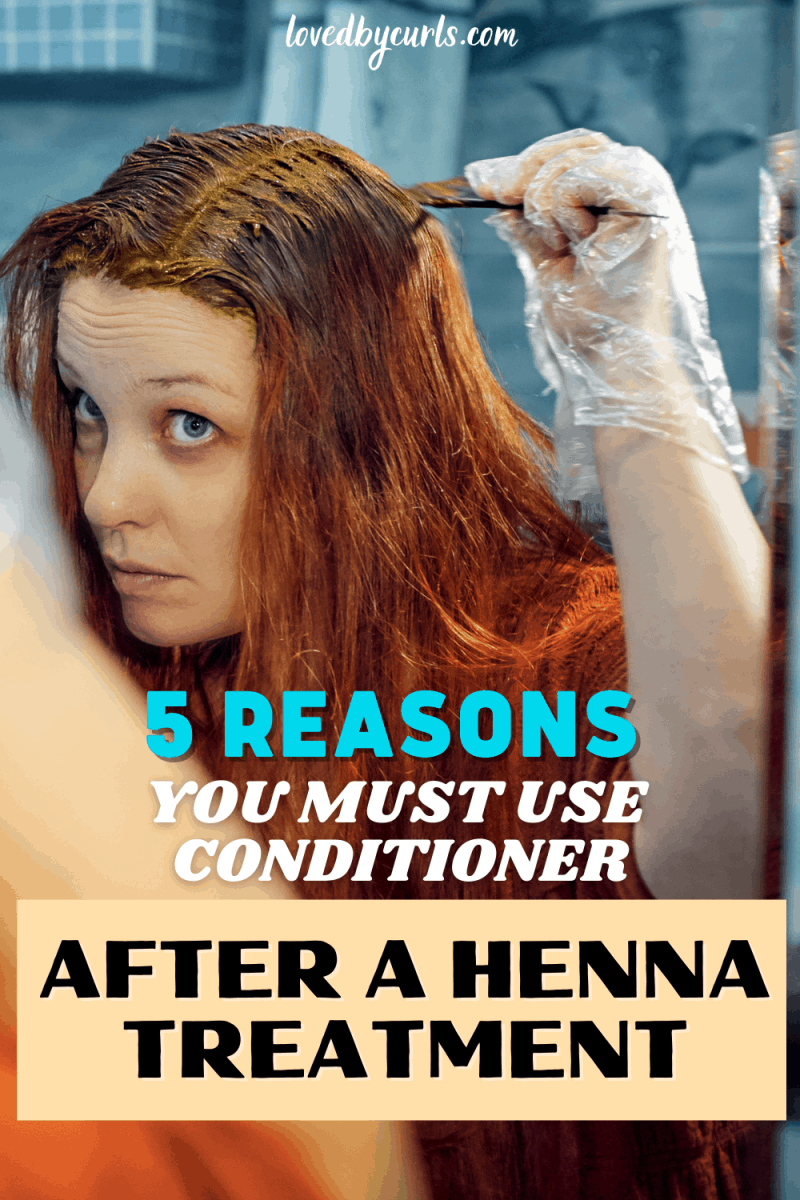The jury is in: using conditioner after a henna treatment is absolutely essential if you want to maximize your hair’s moisture. It’s actually an urban myth that henna drains moisture from hair. However, there is a reason why your locks can feel dry or brittle after using henna.

Using conditioner after any henna treatment is a vital step. In fact, this is known as co-washing, which literally means washing your hair with only conditioner. Not only does this lock in moisture, but it also ensures your tresses will be healthy, happy, and as soft as possible for as long as possible.
Let’s take a more detailed look at why using conditioner after any henna treatment is such an important step in your haircare routine.
This post contains affiliate links and we may earn if you click on them (at no extra cost to you). Please read our full disclosure policy here.
Why Can Hair Feel Dry After Using Henna?
It’s true that your hair can feel dry after using henna, and perhaps a bit gritty or coarse.
This is because henna temporarily changes the structure of your hair, which can result in it feeling brittle.
Hair is a protein. Its shafts are made up of three components: the cuticle, the cortex, and the medulla.
The cortex constitutes the majority of your hair and is made up of the protein keratin. The cuticle is the outer layer of the hair shaft and is an overlapping scale-like structure. The scaley structure is designed to protect the cortex.

Cuticles of straight hair tend to overlap more tightly than those of curly hair – this is why curly hair can be more prone to breakage.
It’s for this reason that women with curly hair especially need to be using conditioner after henna treatments.
When hair undergoes a henna treatment, the cuticles of the hair will physically stand up.
This can result in hair appearing less manageable, and feeling more coarse or dry to the touch.
It’s often recommended that you mix your henna treatment with lemon juice. However, this can cause itchiness and irritation if you have a sensitive scalp or delicate skin.
The extra acidity can also contribute to dryness. It’s, therefore, best to be aware of this when making up your henna dye.
What Happens To Hair That Undergoes A Henna Treatment?
First thing’s first, it’s important to know that henna has a high natural affinity for the protein keratin.
This is why it’s such an ideal natural hair dye, as it provides fantastic lasting color with minimal chemicals, unlike regular hair dye.
Henna is also known for adding shine and body to hair. It also helps tresses feel healthier if it’s used properly.
When hair undergoes a henna treatment, this is what happens:
- The compounds in the henna leaf known as hennosides react and oxidize to form a dye known as lawsone.
- This lawsone then binds with keratin in the hair. It’s a common misconception that henna coats the hair. Instead, the dye molecules migrate into the outer layer of each hair strand. This means that the hair is stained or varnished rather than penetrated.
- The cuticle of each hair shaft plumps up, and the hair is strengthened. This ensures that breakages are minimized and moisture levels are balanced.
- If you have particularly curly hair, this can result in some loosening of the texture. To prevent this, you can always add amla powder to your henna if you want to keep hold of your tight curls.
Why You Should Be Using Conditioner After A Henna Treatment
These are the five reasons why we recommend using conditioner after a henna treatment.
Henna Is A Traditional Botanical
Henna is used as a natural hair dye, and as an alternative to synthetic options.
However, as with most things, overuse of henna can interfere with your hair’s ability to support itself.
Typically, this can result in your hair struggling to retain moisture.
By using conditioner after a henna treatment, you’re supplementing your hair’s moisture levels, and slowing this process.
2. Co-washing Moisturizes Your Hair After Using Henna
Co-washing means washing your hair with conditioner only. This ensures that any residual dye is removed from your hair.
It also helps mitigate feelings of dryness or grittiness in your locks and scalp.
3. Conditioner Helps Remove Excess Henna
This is particularly important for people with sensitive skin to be using conditioner after a henna treatment.
If you’re already vulnerable, any excess dye that remains on the scalp can cause severe itchiness.
This might in turn lead to the unwanted side effect of dandruff or eczema.
4. Avoid Staining
When you use conditioner in order to remove any trace of henna treatment, you’re also reducing the likelihood of residual dye staining your clothes or bedsheets.
After all, henna is beautiful on your hair or skin, but less so on your pillowcases.
5. Use As a Weekly Deep Conditioner For Added Moisture
It’s also a great idea to use a weekly deep conditioning treatment on your hair after dyeing it with henna. Try using a thermal heat cap for maximum effect.
This will help to detangle hair, lock in moisture, and will also keep your hair dyed for longer – a win-win.
How To Apply Conditioner After Using Henna

Below is a practical, step-by-step guide to using conditioner after having had a henna treatment.
Of course, this is just a suggestion, and you’re welcome to customize your routine depending on your needs – and those of your hair!
Instructions:
Step 1
First, be sure to rinse all of the henna dye from your hair. There are a number of ways you can do this.
You can fill a bathtub and dunk your head under the water. Or, if that seems too messy, dip your head into a sink.
The water will be murky after the first dunking, so bear this in mind.
Step 2
Use your hands to massage out any extra henna paste. You may need to repeat these steps several times. Don’t forget to use clean water each time.
Work a generous amount of conditioner into your hair. Be as gentle as possible.
Removing any residual henna dye will reduce feelings of coarseness or dryness in your hair. It’s worth taking time for this step for that reason.
Step 3
Rinse your hair with water, and repeat this process as necessary. Using cold to cool water is a great idea as it helps the hair cuticle to tighten and close.
This also eliminates brittle-feeling hair.
Step 4
If you have the time, leave your conditioner in for 20 – 30 minutes.
Using a steamer or a hairdryer is also a great idea. This opens the cuticles up, allowing the dye and moisture to sink deeper into each hair strand.
The ideal situation is using cold water to rinse, and heat to lock in moisture. This is because heat opens the hair shaft whereas cold closes it.
Depending on your hair’s porosity, you can use shampoo after using henna without reducing the benefits of the treatment.
However, this varies according to your hair type. Usually, most people benefit from using only conditioner after henna.
You can return to your regular hair washing schedule after about 2 – 3 days, once the henna color has really settled.
Waiting 6 – 8 weeks between treatments is a good idea. This means you’ll avoid over-coating your hair in henna.
Be warned! After having had a henna treatment, you should be using a moisturizing conditioner, and not any product with protein.
If you use protein conditioner after henna, this will result in very rough, dry-feeling hair. This is because your hair has too much protein in it.
It can sometimes be difficult to assess when to use a deep conditioning treatment vs a protein treatment, but the general rule is if your hair feels rough and straw-like, you have too much protein. If it feels limp and dull, you may be experiencing moisture overload.
If you’re keen to give your hair a pre-henna treatment, you can always oil it or use the LOC or LCO method to lock in moisture. However, just make sure not to mix henna with oil as the dye will lose its effectiveness.
By doing a pre-henna treatment, you boost its moisture levels and will reduce any dye dripping out of your hair whilst it sinks in.
The best oils to use are either olive oil or coconut oil. If you feel that using conditioner after a henna treatment isn’t for you, smothering your hair in apple cider vinegar is a great alternative.
The Best Moisturizing Conditioners To Use After Henna Treatment
So, you’re up to speed on why you should be using conditioner after every henna treatment.
But do you know which products are the best for deep conditioning? Below, we’ve picked our top five.
Remember, if you look for a conditioner yourself, you need to choose one without protein.
Using a protein conditioner after a henna treatment will cause your hair to feel dry and brittle – exactly what we’re trying to avoid.
Moroccanoil Intense Hydrating Hair Mask
If you’re keen on supplementing your conditioner with a hair mask, the Moroccanoil Intense Hydrating Hair Mask is the one for you.
This five-minute miracle works for medium to thick hair. It’s a rich, creamy formula designed to improve your hair’s texture, as well as its elasticity and shine.
The argan oil and linseed extract are naturally derived and burst with antioxidants, delivering natural moisture to nourish your locks.
Mielle Organics Mongongo Oil Hydrating Conditioner
For tightly coiled, natural hair, this is the treatment for you.
There’s organic almond and mongongo oils in this conditioner, making it ideal for using after henna.
There are no parabens or silicone, and it’s designed for both relaxed and natural hair. Best applied to wet hair and leave in for 15 minutes before rinsing.
Jessicurl Deep Conditioning Treatment
Calling all curly girls! This vegan, cruelty-free conditioner is for you.
The Jessicurl Deep Conditioning Treatment offers intense pampering for hair, without building up or coating. The citrus and lavender scents are delicious and of course, shea butter can help nourish your hair.
Your hair will be looking healthier and less frizzy in no time.
Briogeo Farewell Frizz Rosarco Milk Leave In Conditioning
No-fuss, no-frills. This leave-in conditioner from Briegeo, is great for using after henna if you’re short on time. Just spray into the hair and leave it to dry.
Detangle hair, tame frizz, and restore shine. Rose, hip, argan, and coconut oil smell delicious, and added vitamin E helps your hair restore its natural health.
Plus, you can use it on wet or dry hair – so you could even use it on the go.
As I Am Hydration Elation Intensive Conditioner
This conditioner from As I am is designed to stimulate the scalp and hair shaft.
It works to smooth and align the cuticle layer, and is, therefore, a perfect conditioner for using after henna.
It’ll repair split ends and strengthen weaker shafts, improving overall hair health. Use after cleansing and leave on for 15 – 30 minutes. Then rinse thoroughly.
References:
Hair Structure
https://www.hshairclinic.co.uk/hair-loss/all-about-hair/hair-structure

Disclaimer: This site is not intended to provide professional or medical advice. All of the content on LovedByCurls.com is for informational purposes only. All advice should be followed at your own discretion. Ingredients may change at any time so always check the product label before using. Check our full disclaimer policy here.





